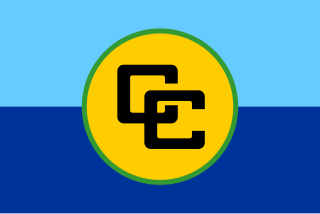
Modern Trinidad and Tobago maintains close relations with its Caribbean neighbours and major North American and European trading partners. As the most industrialized and second-largest country in the English-speaking Caribbean, Trinidad and Tobago has taken a leading role in the Caribbean Community (CARICOM), and strongly supports CARICOM economic integration efforts. It also is active in the Summit of the Americas process and supports the establishment of the Free Trade Area of the Americas, lobbying other nations for seating the Secretariat in Port of Spain.

The Caribbean Community is an intergovernmental organisation that is a political and economic union of 15 member states throughout the Americas and Atlantic Ocean. They have primary objectives to promote economic integration and cooperation among its members, ensure that the benefits of integration are equitably shared, and coordinate foreign policy. The organisation was established in 1973, with its four founding members signing the Treaty of Chaguaramas. Its primary activities involve:

The Caribbean Court of Justice is the judicial institution of the Caribbean Community (CARICOM). Established in 2005, it is based in Port of Spain, Trinidad and Tobago.

Trinidad and Tobago, officially the Republic of Trinidad and Tobago, is the southernmost island country in the Caribbean. Consisting of the main islands Trinidad and Tobago and numerous much smaller islands, it is situated 11 kilometres off the coast of northeastern Venezuela and 130 kilometres south of Grenada. It shares maritime boundaries with Barbados to the east, Grenada to the northwest, Saint Vincent and the Grenadines to the north and Venezuela to the south and west. Trinidad and Tobago is generally considered to be part of the West Indies. The island country's capital is Port of Spain, while its largest and most populous city is San Fernando.

The United Nations Regional Groups are the geopolitical regional groups of member states of the United Nations. Originally, the UN member states were unofficially organized into five groups as an informal means of sharing the distribution of posts for General Assembly committees. Now this grouping has taken on a much more expansive and official role. Many UN bodies are allocated on the basis of geographical representation. Top leadership positions, including Secretary-General and President of the General Assembly, are rotated among the regional groups. The groups also coordinate substantive policy and form common fronts for negotiations and bloc voting.
ICC Americas is an international body which oversees cricket in countries in the Americas. It is a subordinate body to the International Cricket Council (ICC). The organisation currently has 17 members, located in Northern America, Central America, South America, and the Caribbean, and is responsible for the development, promotion and administration of the game in the above regions.
United Nations Security Council Resolution 175, adopted on September 12, 1962, after examining the application of the State of Trinidad and Tobago for membership in the United Nations the Council recommended to the General Assembly that the State of Trinidad and Tobago be admitted.

Trinidad and Tobago – United States relations are bilateral relations between Trinidad and Tobago and the United States.

The following outline is provided as an overview of and topical guide to Trinidad and Tobago:

Foreign relations between Barbados and Japan were formally established on 29 August 1967. Japan is accredited to Barbados from its regional Embassy in Port of Spain and an honorary consulate in the parish of Saint George. Barbados is represented in Japan through a non-resident ambassador in Bridgetown. Japan's new Ambassador for Barbados, Mitsuhiko Okada announced a new direct embassy to Barbados would be established located in Bridgetown in February 2016.

United Nations Security Council Resolution 1931, adopted unanimously on June 29, 2010, after recalling resolutions 827 (1993), 1581 (2005), 1597 (2005), 1613 (2005), 1629 (2005), 1660 (2006), 1668 (2006), 1800 (2008), 1837 (2008), 1849 (2008), 1877 (2009), 1900 (2009) and 1915 (2010), the Council noted that the 2010 target for the completion of trials at the International Criminal Tribunal for the former Yugoslavia (ICTY) could not be met, and therefore extended the terms of 23 judges at the ICTY.

United Nations Security Council Resolution 1993, adopted unanimously on June 29, 2011, after recalling resolutions 827 (1993), 1503 (2003) and 1534 (2003), the Council extended the terms of office of 17 permanent and temporary judges at the International Criminal Tribunal for the former Yugoslavia (ICTY).

The 1986 United Nations Security Council election was held on 16 October 1986 during the Forty-first session of the United Nations General Assembly, held at United Nations Headquarters in New York City. The General Assembly elected Argentina, Italy, Japan, West Germany, and Zambia, as the five new non-permanent members of the UN Security Council for two-year mandates commencing on 1 January 1987.

The 1984 United Nations Security Council election was held from 22 October to 18 December 1984 during the Thirty-ninth session of the United Nations General Assembly, held at United Nations Headquarters in New York City. The General Assembly elected Australia, Denmark, Madagascar, Thailand, and Trinidad and Tobago, as the five new non-permanent members of the UN Security Council for two-year mandates commencing on 1 January 1985. Madagascar, Thailand and Trinidad and Tobago were elected to Council for the first time.

Elizabeth II was Queen of Trinidad and Tobago from the independence of Trinidad and Tobago on 31 August 1962 until the country became a republic on 1 August 1976. Her constitutional role as head of state was delegated to a governor-general, who acted on the advice of government ministers.

Philip Louis Ulric Cross was a Trinidadian jurist, diplomat and Royal Air Force (RAF) navigator, recognised as possibly the most decorated West Indian of World War II. He is credited with helping to prevent some two hundred bombers from being shot down in a raid over Germany in 1943. He subsequently studied law at London's Middle Temple, and went on to fulfil a distinguished international career as a jurist across Africa and within Trinidad and Tobago. He also served as a diplomat for Trinidad and Tobago to the United Kingdom.

The 1966 United Nations Security Council election was held on 11 November 1966 during the Twenty-first session of the United Nations General Assembly, held at United Nations Headquarters in New York City. The General Assembly elected Brazil, Canada, Denmark, Ethiopia, and India, as the five new non-permanent members of the UN Security Council for two-year mandates commencing on 1 January 1967.
Malaysia became the 82nd member of the United Nations on 17 September 1957. Malaysia has held a rotational non-permanent seat on the United Nations Security Council for four terms, and has participated in over 30 United Nations peacekeeping missions since October 1960.

Trinidad and Tobago–Yugoslavia relations were historical foreign relations between Caribbean island nation of Trinidad and Tobago and now split-up Socialist Federal Republic of Yugoslavia.















